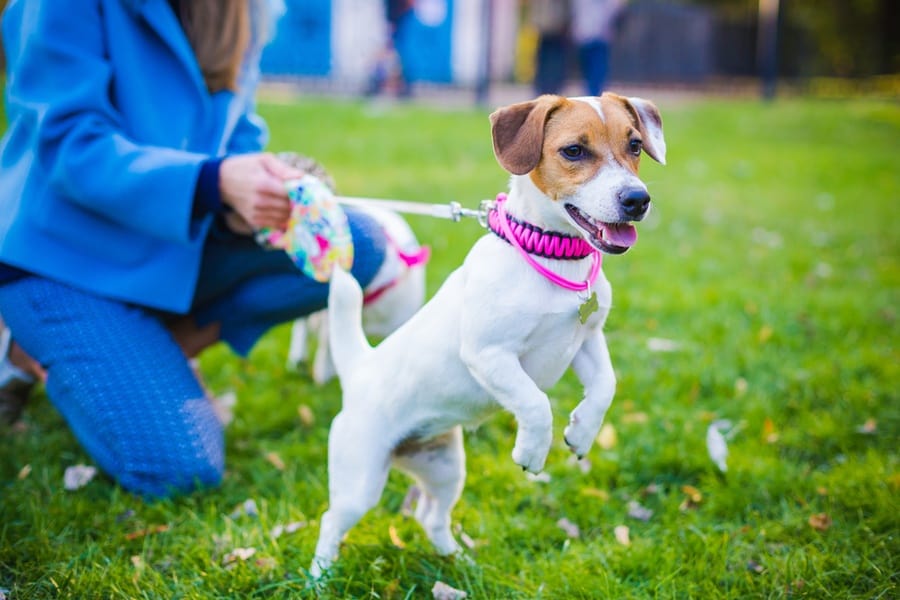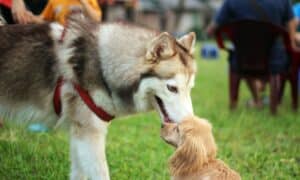“This post contains affiliate links, and I will be compensated if you make a purchase after clicking on my links.”
The 6 Types of Barking (and how to deal with each):
1. Excitement Barking:

Excitement barking is the type of barking a dog uses to express positive emotions. It can range from happiness up to anticipation of something good that is about to take place. Excitement barking is a sign of a very happy pup and doesn’t necessarily need to be discouraged and should never be punished.
Some examples of excitement barking are when a dog owner comes home after work, when the dog is aware that he will be going out for a walk to the park, or seeing another dog and anticipating getting to play.
Excitement barking is usually higher-pitched, somewhat frantic or chaotic, and the dog may make a series of barks with a little break or a little bit of whining in between. Excitement barking usually comes with activity patterns such as jumping up and down, spinning, running or all of these actions at the same time.
Overly-excited dogs might add behaviors such as hysterical barking, jumping up, biting their leash or the pants and legs of their owners, running around while knocking things over, pulling their leash or lunging at other objects, dogs or people. While a dog should not be reprimanded for such behavior (as it is a result of positive excitement), he also should not be rewarded. The dog should be taught that the reward (getting to go for that walk, being allowed to greet a guest, etc) happens only after the dog has stopped barking and calmed down.
How to stop excitement barking:
Because excitement barking occurs in a variety of scenarios and circumstances, there is no one-size-fits-all solution to stopping this type of barking. Instead, consider the scenario, what is exciting the dog, and reward him for calming down.
A few examples:
– When an owner comes home and is greeted by his dog’s excitement barking, the owner should show calming signals such a quietly patting the dog or even give the dog some time to calm down. It is important to give an excited dog attention but it shouldn’t be an exaggerated response such as immediately playing with the dog or fussing.
– When a guest arrives and the dog becomes excited, the owner can place himself between the dog and the door and wait for the dog to calm down before letting the guest inside. The owner should also advise the guest to greet the dog only when he’s calm. Do not reprimand your dog if he gets excited when a guest arrives as this can put the dog on defense and potentially develop into reactivity or aggression toward guests as he learns that a guest arriving at the home leads to punishment.
– Dogs get excited to go on car rides because they anticipate that they are heading off somewhere fun. You can reduce this type of excitement barking by taking the dog on short and boring trips on a regular basis.
Important reminders:
Don’t reward the wrong behavior. Be mindful of the type of attention you give to dog that engages in excitement barking. Giving the dog immediate attention can teach him that he is being rewarded for barking. Instead, wait until he calms down before rewarding.
Never reprimand or punish a dog that is barking due to excitement as this could inadvertently teach him that whatever it is that’s exciting him is leading to his punishment. (And a good way to turn a happy dog into a fearful or reactive dog.)
Click the Next > Button below:



















Pingback: How to Stop a Dog from Barking - LabradorTrainingHQ
Ben
Dec 25, 2016 at 11:19 am
Noreen dogs are nocturnal, although they have been domesticated by human beings however they have many similarities with their closest cousins – wolves. Activity including barking can increase during night since basic traits and basic features make them do that. The best you can do for your dog and your grand daughter is to get your dog a few activities in the daytime so that he is tired dozes off in the night for that take help of dummies for dog training. Besides change the lighting pattern of the place where your dog is at night and observe which lights soothe him not to bark.
noreen
Oct 21, 2016 at 1:47 am
My 3 year old labrador retreaver barks at night a short as i call it a call bark have tried talking, hand signals leaving him but he eventually stops for a while then starts up again. He sleeps outside has since 9 months old, cannot come indoors as my son is allergic to dog hair, i think he is lonley i have to stay with him and do treat him to keep him quiet i know its wrong but i have to keep him quiet or he wakes my 2 year old granddaughter up. During the day he is quiet or barks to let me know someone is there i am more than frustrated, i understand he must listen but he will not be able to stay. I play with him during the day and give him as much attention as possible, any suggestions.